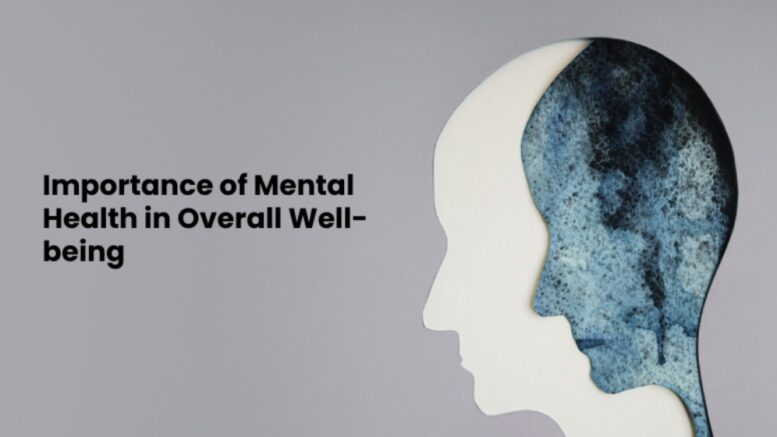Mental health stands as a crucial thread weaving through our emotional, psychological, and social experiences. Yet, despite its paramount importance, the concept of mental wellbeing is often misunderstood or overlooked. In this blog we’ll explore What is Mental Health and the profound significance it has in our lives, shedding light on what mental health truly entails and why nurturing it is essential for a holistic sense of well-being.
Table of Contents
- What is Mental Health?
- The Foundation of Overall Well-being
- Breaking the Stigma: Embracing Mental Health
- Nurturing Mental Health: Practical Strategies
- The Ripple Effect on Physical Health
- Conclusion
What is Mental Health?
Before unravelling the relevance of mental health, it’s vital to grasp what it implies. Despite widespread belief, mental health refers to more than simply the absence of mental disease; rather, it’s a comprehensive term that includes the capacity to successfully manage stress, engage in fulfilling activities, make positive contributions to one’s society, and realise one’s full potential in life. Emotional toughness, stress management, and satisfying social connections are all essential components of a healthy mind.
The Foundation of Overall Well-being
Here we explore more about the The Foundation of Overall Well-being:
- Emotional Resilience: Mental health contributes significantly to our ability to navigate the ups and downs of life. A strong mental constitution can recover quickly from failures, embrace new experiences, and have a cheerful attitude regardless of the severity of the situation. Maintaining one’s emotional stability is fundamental to fulfilment in life.
- Cognitive Functioning: Mental health is intricately linked to cognitive functioning, including our ability to think, learn, and make decisions. Maintaining mental health allows more effective information processing, problem-solving, and lifelong learning.
- Interpersonal Relationships: Healthy mental states promote positive interactions with others. Positive mental health includes forming and sustaining meaningful connections, showing empathy, and articulating one’s feelings. Having supportive relationships in one’s life is crucial to one’s well-being.
- Stress Management: Life is replete with stressors, but a sound mental health foundation equips individuals with effective stress management strategies. A healthy mind can better deal with stress in all its forms, whether work-related pressure, personal issues, or social stresses. As a result, a healthy mind can better avoid the negative health effects of chronic stress.
Breaking the Stigma: Embracing Mental Health
Misconceptions and prejudices against those who seek help for mental health issues continue in our society. Myths that people with mental health problems are weak or lack resilience need to be debunked. Mental health difficulties may impact everyone, irrespective of age, gender, or origin.
Fostering a culture of open talks is crucial to raising awareness about mental health issues. Creating a safe space for people to talk about their feelings, pressures, and the benefits of reaching out for help may go a long way towards helping them take care of their mental health. Recognising the significance of mental health necessitates recognising the availability of services for help. Professional mental health care, crisis hotlines, and advocacy groups in the local community are all included.
Nurturing Mental Health: Practical Strategies
Let’s go into more practical stages of nurturing mental health:
- Prioritising Self-Care: Incorporating self-care practices into daily routines is vital in maintaining mental wellness. Things like working out, paying attention to your breathing, getting enough sleep, and doing things you like may all help.
- Constructing Resilience: Strengthening one’s ability to bounce back from adversity requires a commitment to a continuing process that includes practising optimism, welcoming change, and learning from mistakes. Reframing negative thoughts and keeping a gratitude book are two practices that might help you become emotionally resilient.
- Seeking Professional Support: Getting Professional Treatment Getting professional treatment for mental health issues is as important as getting medical care for physical health issues. Professionals in the field of mental health, such as therapists, counsellors, and psychiatrists, may be invaluable allies in navigating difficult emotions and situations.
The Ripple Effect on Physical Health
Acknowledging the relationship between one’s mental and physical well-being is crucial. Both mental and physical health are affected by one another. The physiological effects of stress on the cardiovascular system, the immunological system, and general vigour are only a few examples. In contrast, taking care of one’s body via exercise and a healthy diet may boost one’s mental health.
Conclusion
If you want to live a life that matters, taking care of your mental health should be at the top of your list of priorities. Mental health is not only the absence of mental disease; it also includes a person’s capacity for flourishing, resilience, and emotional well-being. Steps towards a more complete well-being include eliminating prejudice, encouraging honest dialogue, and adopting concrete methods for supporting emotional and mental health. The more people become aware of the close relationship between their mental and physical health, the more likely it is that they will live in a culture that places a premium on mental health.
